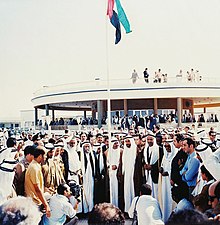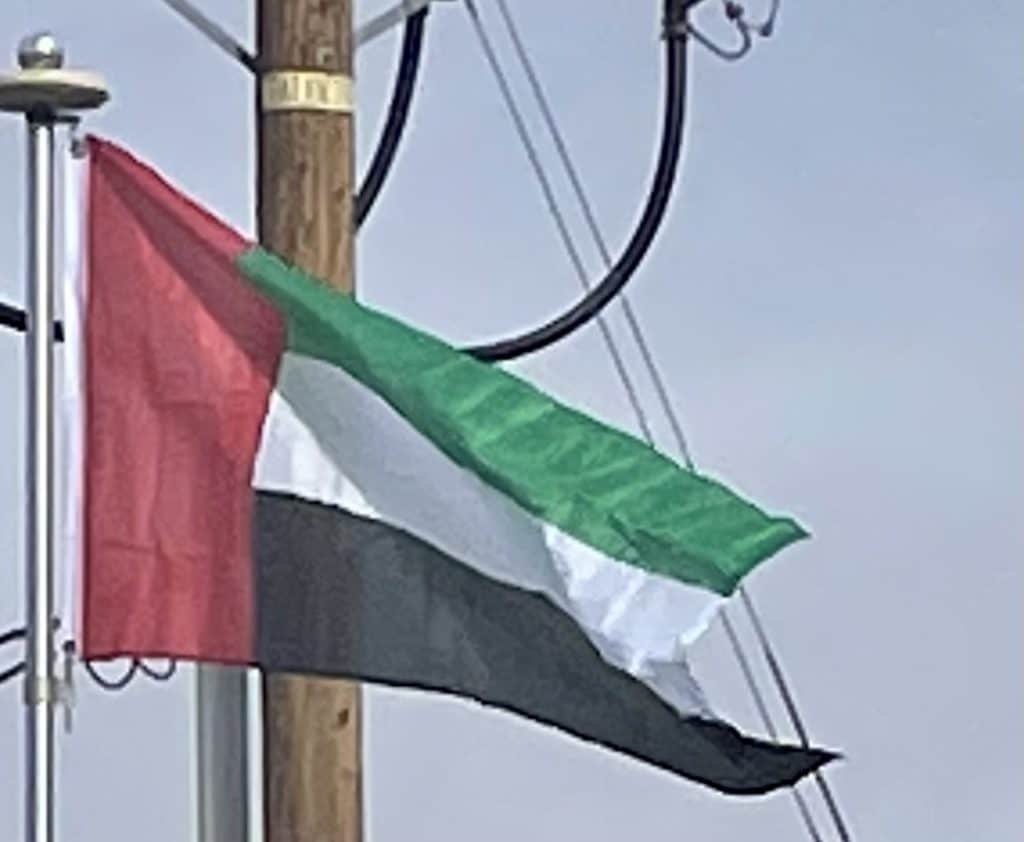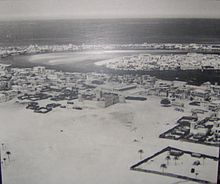The British set up a development office that helped in some small developments in the emirates. The seven sheikhs of the emirates then decided to form a council to coordinate matters between them and took over the development office. In 1952, they formed the Trucial States Council, and appointed Adi Bitar, Dubai’s Sheikh Rashid‘s legal advisor, as Secretary General and Legal Advisor to the council. The council was terminated once the United Arab Emirates was formed. The tribal nature of society and the lack of definition of borders between emirates frequently led to disputes, settled either through mediation or, more rarely, force. The Trucial Oman Scouts was a small military force used by the British to keep the peace.
In 1953, a subsidiary of BP, D’Arcy Exploration Ltd, obtained an offshore concession from the ruler of Abu Dhabi. BP joined with Compagnie Française des Pétroles (later Total) to form operating companies, Abu Dhabi Marine Areas Ltd (ADMA) and Dubai Marine Areas Ltd (DUMA). A number of undersea oil surveys were carried out, including one led by the famous marine explorer Jacques Cousteau. In 1958, a floating platform rig was towed from Hamburg, Germany, and positioned over the Umm Shaif pearl bed, in Abu Dhabi waters, where drilling began. In March, it struck oil in the Upper Thamama, a rock formation that would provide many valuable oil finds. This was the first commercial discovery of the Trucial Coast, leading to the first exports of oil in 1962. ADMA made further offshore discoveries at Zakum and elsewhere, and other companies made commercial finds such as the Fateh oilfield off Dubai and the Mubarak field off Sharjah (shared with Iran).
Meanwhile, onshore exploration was hindered by territorial disputes. In 1955, the United Kingdom represented Abu Dhabi and Oman in their dispute with Saudi Arabia over the Buraimi Oasis. A 1974 agreement between Abu Dhabi and Saudi Arabia seemed to have settled the Abu Dhabi-Saudi border dispute, but this has not been ratified. The UAE’s border with Oman was ratified in 2008.
PDTC continued its onshore exploration away from the disputed area, drilling five more bore holes that were also dry. However, on 27 October 1960, the company discovered oil in commercial quantities at the Murban No. 3 well on the coast near Tarif. In 1962, PDTC became the Abu Dhabi Petroleum Company. As oil revenues increased, the ruler of Abu Dhabi, Zayed bin Sultan Al Nahyan, undertook a massive construction program, building schools, housing, hospitals and roads. When Dubai’s oil exports commenced in 1969, Sheikh Rashid bin Saeed Al Maktoum, the ruler of Dubai, was able to invest the revenues from the limited reserves found to spark the diversification drive that would create the modern global city of Dubai.
Independence:

By 1966, it had become clear the British government could no longer afford to administer and protect what is now the United Arab Emirates. British Members of Parliament (MPs) debated the preparedness of the Royal Navy to defend the sheikhdoms. Secretary of State for Defence Denis Healey reported that the British Armed Forces were seriously overstretched and in some respects dangerously under-equipped to defend the sheikhdoms. On 24 January 1968, British Prime Minister Harold Wilson announced the government’s decision, reaffirmed in March 1971 by Prime Minister Edward Heath, to end the treaty relationships with the seven Trucial Sheikhdoms, that had been, together with Bahrain and Qatar, under British protection. Days after the announcement, the ruler of Abu Dhabi, Sheikh Zayed bin Sultan Al Nahyan, fearing vulnerability, tried to persuade the British to honor the protection treaties by offering to pay the full costs of keeping the British Armed Forces in the Emirates. The British Labour government rejected the offer.[67] After Labour MP Goronwy Roberts informed Sheikh Zayed of the news of British withdrawal, the nine Persian Gulf sheikhdoms attempted to form a union of Arab emirates, but by mid-1971 they were still unable to agree on terms of union even though the British treaty relationship was to expire in December of that year.

